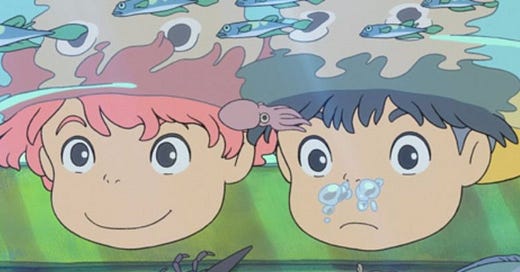This week, I watched Ponyo with Aya. The movie is almost two hours long and she’s not quite two years old, so we did it in multiple sittings, sometimes at the dining table, sometimes in bed with my laptop propped on the clothes-drying rack. I grew up with Studio Ghibli movies — I think of them as some of my earliest models of what I still find most beautiful: plants rustling in the breeze, insects glittering over the grass, interstitial moments in a story that turn it into poetry — but I haven’t watched one in years.
I could see the difference in Aya’s attention as she watched Ponyo compared to the way she watches shorter-episode shows like Bluey. From the opening scene, where the perspective slowly sinks from boats on the surface of the water down below, past moon jellies and crabs and cuttlefish, past herds of plankton and into Ponyo’s father’s enchanted bubble, music building all the while, she was rapt. “Wow, wow,” she repeated.
As we watched, I talked with her, especially when she got scared. If you haven’t seen Ponyo before, it follows a human boy (Sosuke) as he meets a magical fish-girl (Ponyo), whose wizard father tries to bring her back home using enchanted water-creatures that grow into tsunami — or, as Aya calls them, “big whales!” At one point, I heard myself telling Aya, “Sosuke’s mama can’t see the big whales because they’re magical, and adults have a harder time seeing magic.” It occurred to me that this was my first time watching a Ghibli movie in the position of parent, or non-magic-seer.
Since having Aya, I think about magic all the time. In practical terms, this has looked like spending time with plants, eating fresh food, creating community and appreciating people’s different attributes and skills, playing music and dancing, being open to spontaneous play, looking at the moon, reading and going to the library, nurturing empathy for all beings, including plants and insects. But these are all things within my awareness. What is the magic Aya is growing into as I age out of it?
At the same time that we watched Ponyo, I have also been listening to Youngmi Mayer’s memoir, I’m Laughing Because I’m Crying. In one part, Mayer describes nearly being kidnapped by a drunk man when she was a child, until two other children intervened. Adults had been walking by near enough to help, but they weren’t paying attention. She goes on to mention a horrible child abuse case that happened years later and began similarly, with a grown man kidnapping a young girl in public. Where were the children who had helped the author? she asks. Then she realized those children were now adults.
Maybe this is the Ghibli magic, higher stakes than I realized — the act of paying attention wholeheartedly, not just to the joyful parts of daily life I try to share with Aya, but also to safety, to need, at the scale of genocide and hateful policy and that of an individual child, relying on your care.
Journaling prompt:
Do you remember seeing magic as a child, metaphorically or literally? How can you connect with it now in a way that you can offer to others?
One thing I loved this week:
“In Defense of Despair,” Hanif Abdurraqib, The New Yorker: “I want [my students] to consider the responsibilities of the heart, responsibilities that the world will attempt to detach them from in the name of individualism, or the ever-growing realities of isolationist attitudes and power’s contempt for community. I am asking them, as I am continually asking myself, to imagine a heart that feels a connection to the hearts of others, even others you do not know. I would like to think that this is what nudges me forward, more than some mythological concept of ‘hope.’”


